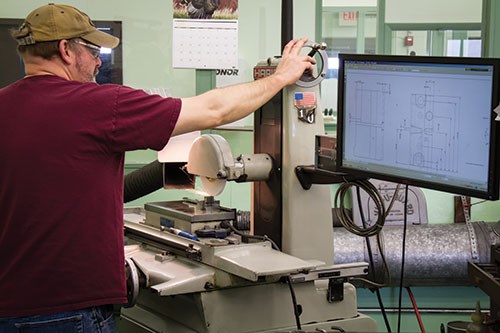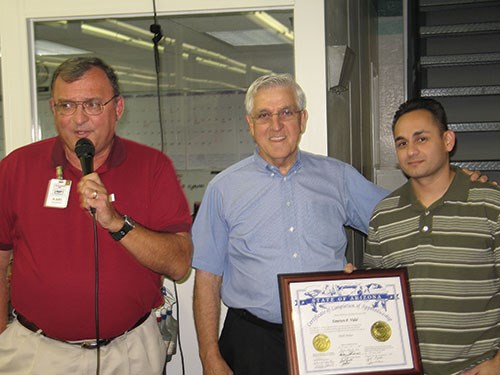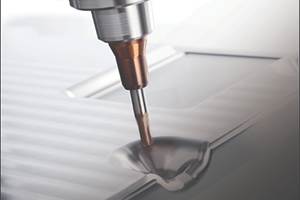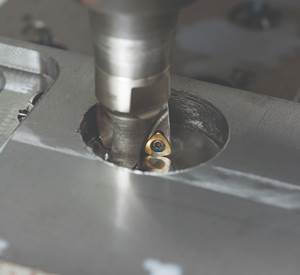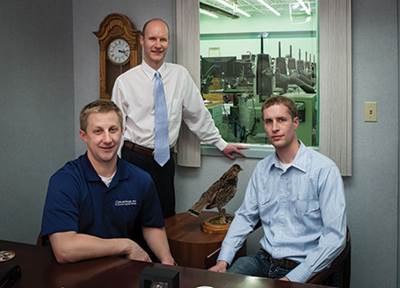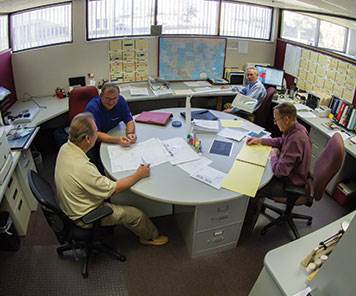Education and Training Triumphs
The 2013 Leadtime Leaders detail their apprenticeship training and educational programs—and the rewards they reap.
Both of MMT’s 2013 Leadtime Leaders—Tech Mold, Inc. (Tempe, AZ) and Micro Mold Company, Inc. (Erie, PA)—have credited their loyal, dedicated employees with their success. Currently, the industry is facing a skilled labor shortage, which has resulted in these two companies taking the “lead” in offering solid apprenticeship programs and additional training to bring in new talent.
Both mold manufacturers work with local high schools and community colleges to target young people who possess the skills needed to work in various positions. Here are some of the secrets to their success.
Growing Their Own
Tech Mold President Bill Kushmaul has a “grow your own” philosophy when it comes to training. “We believe that we can’t depend on trying to find people ‘out there somewhere’ to fill the bill, but must ‘grow’ our own as time goes on,” he remarks. “When you have apprentices you can train them in your manufacturing and quality culture. As their knowledge and experience grows they can help the next generation of apprentices. Long-term, apprentices are the future of any company and we feel that our continued success depends on them.”
Tech Mold VP of Operations Karl Szanto oversees the apprenticeship program—along with Chris Zoucha, the current apprentice mentor for the company. “Typically, we have four to six apprentices at any given time, which is about the right number for our 85-person shop,” explains Szanto, noting that currently there are only three apprentices in the program, but the company is looking for more.
For each apprentice Tech Mold signs an Apprentice Agreement. The program is sanctioned by the State of Arizona’s Commerce Authority, which oversees all the apprenticeship programs for the various trades. However, Szanto says that Tech Mold has a “great relationship” with its contacts at the State level, and the company is allowed to teach what it knows is required. The company does get audited periodically to make sure the program guidelines are being followed.
Finding people who want to participate in the apprentice program takes some leg work. “We’re making more inroads with local schools such as the East Valley Institute of Technology (EVIT), which works with high schools to provide regular academic classes in the afternoon and EVIT programs in the morning,” says Szanto.
Typically, Szanto explains, they like to find people who are already working in some form of the metal working trade and have experience in operation of basic related entry level machinery and hand tools. Other options are successfully completing Machining Technologies courses at the Community College level or a B.S. in Mechanical Engineering that includes classes in CAD and manufacturing methods or high school students who have participated in hands-on machining classes with classroom shop math and related subjects such as those in the EVIT program, and who are certain of the career path they want.
The first step is taking the written test, which was developed by the American Mold Builders Association, and scoring a minimum of 75 percent on that entrance exam. Apprentice candidates are then interviewed by five peers, other apprentices in the program, and a moldmaker. “These are people who have a vested interest in the apprentice candidate’s success,” says Szanto.
“We hire a machinist trainee and they will spend 60 to 90 days learning basic skills,” he says. “We then evaluate them to see if they will be accepted into the program. We like them to be pretty certain that it’s the type of work they want to do, and we count those two to three month’s work toward their work experience credit.”
Once in the program, the apprentices are evaluated every 90 days by Zoucha and the department leader where the apprentice worked. Zoucha also handles the classroom activities which take place once a week and includes classes in math, steel types, plating, and other classes pertinent to mold manufacturing. “We also have outside resources such as suppliers come in and talk about taps, drills and other equipment,” Szanto says. “We also encourage them to take formal classes in math, programming CAD and GD&T outside of Tech Mold at a local community college.”
Apprentices are rotated at approximately three month intervals through the various departments in the company. “The mold base area is critical to their training. That’s where they really get to understand our product and business, and they can spend up to one year in that department,” says Szanto. “This is where they learn how molds go together, come apart, and the intricacies of hot runner systems.”
The quarterly evaluations include many different areas besides technical know-how, such as punctuality, attendance, personal appearance, cleanliness, and attitude including cooperativeness with co-workers and supervisors, and work flexibility – the ability to do a variety of different tasks and a willingness to change direction and do different tasks when asked.
“Our program has proven to be very effective,” Szanto comments. “It’s a four-year program that takes dedication to complete. Some have gone through in less time due to previous on-the-job training by Tech Mold—even as little as two years. However, the majority take the full four years. By that time, many of them know where they’d like to spend their careers.”
Most of the apprentices Tech Mold trains stay with the company long term. “We provide the opportunities for them to learn and we’d like them to stay in the apprenticeship program until completion,” Szanto says. “However, if they do leave after graduating we don’t let that discourage us. We’ll continue the program.”
Industry Immersion
At Micro Mold, the company is heavily involved in the industry—which is helpful in recruiting new talent—in addition to its practice of hiring degreed plastic engineers in its tooling and molding departments. The company works closely with Penn State—Erie, The Behrend College. According to Micro Mold President/GM Ryan Katen, this branch of Penn State is one of only a handful of colleges in the nation that offer a Bachelor’s degree in Plastic Engineering technology. “The professors in this engineering program have decades of real-world experience in the moldmaking, processing, design and manufacturing fields. Our close relationship with Penn State allows us to recruit knowledgeable and skilled employees whom arrive at Micro Mold ready to join our team.
“Our Engineering Manager at Micro Mold, Chris Hanes, was a member of one of the first few classes to graduate from Penn State’s Plastic Engineering program, and he began his career with Micro Mold in 1991,” Katen continues. “This is a major benefit to our customers since Chris (and others) can effectively communicate on a very technical level and find solutions to potential product risks (i.e. undercuts, non-uniform wall thickness, hesitation regions within the design, gating location, etc.). This added level of expertise and support is truly what separates Micro Mold from our competition, which may not have this in-depth understanding and experience with respect to plastic phenomena within the mold.”
Additionally, Micro Mold plays an active role on Penn State’s Plastic Alumni Advisory Board. Manufacturing Manager Robert Cooney provides “real-world” knowledge and insight to up-and-coming engineers and advises on the future strategic direction of the Plastic Engineering program. Katen notes. “In addition to these strong ties with Penn State, our team also engages in cutting-edge research and development opportunities with Penn State’s faculty and students,” Katen details “Our hands-on involvement with Penn State has resulted in many industry advancements, which we believe have directly benefited our customers.”
The company also relies on the experience of its veteran staff to work with, teach and mentor its apprentices on proper mold design guidelines and mold fabrication techniques. Moreover, Katen is on the advisory boards for the Erie County Technical School and Central Technical High School. “These advisory boards were established as a way to offer co-op programs to high school students who are interested in various fields of manufacturing,” Katen affirms. “This is one other way that our management continues to stay involved by educating the next generation of toolmakers.”
Katen explains that the fundamental training program that each toolmaker at Micro Mold must complete before he or she earns their Toolmaker papers is their Journeymen’s apprenticeship. During this apprenticeship, prospecting toolmakers will complete 576 hours of night school class work in conjunction with 8,000 hours of on-the-job training. “This is a rigorous four-year training program that Micro Mold offers to up-and-coming toolmakers,” he says. “This apprenticeship program is governed and controlled in collaboration with the Commonwealth of Pennsylvania’s Department of Labor, who will approve and register an individual as a certified toolmaker. At present, we have three young individuals in the process of earning their Journeymen’s papers. Furthermore, Micro Mold employees 12 other toolmakers that have received the same training and are now certified toolmakers.”
Micro Mold also offers its employees training and leadership programs like the following:
• Effective Sales and Marketing Training (offered by Dale Carnegie Systems): an eight- week long training program that targets the sales cycle (i.e. prospect, interested, objections, commitment and close) and how to effectively manage customer objections and expectations;
• Process Troubleshooting and Mold Validation (instructed by John Bozzelli): Bozzelli is well known throughout the industry for his multiple patents and extensive training seminars that focus on scientific molding. A few Micro Mold & Plastikos employees have attended the three-day long training course that covers the fundamentals of part design, industry mold standards, interpreting molding graphs, and process troubleshooting, among other topics;
• Two team members are working through the Organizational Leadership Graduate Certificate Program (with the support of Micro Mold and Plastikos) at Mercyhurst University, which is another local university in the Erie area mercyhurst.edu/academics/graduate%20certificates/organizational-leadership)
The company also partners with J.L. Nick & Associates, a company that specializes in human resource and management consulting. “J.L. Nick has been a major asset for our organization during the interviewing and hiring process as well as developing internal employee training programs,” Katen states. “Furthermore, we have utilized J.L. Nick’s consulting services for leadership development, strategic/business planning, custom manager and supervisor trainings, and employee reward programs, among others.”
Katen emphasizes that Penn State-Erie has been an incredibly useful resource when recruiting tooling and processing engineers to join the Micro Mold team. “Approximately 10 percent of our entire workforce at Micro Mold and our sister company Plastikos is a graduate from the Plastic Engineering Technology program,” he comments. “Management at Micro Mold attend Behrend’s annual career fair each fall with the intent of identifying future interns and full-time employees.”
Formula for Success
The proof of the success of Tech Mold’s apprenticeship program is in the fact that many of the employees have 20+ years with the company, Kushmaul notes. Several have spent their entire careers with the company and retired from Tech Mold.
The same holds true at Micro Mold. “There are nine members of the Micro Mold team who have been with us for over 20 years,” Katen says. “That equates to more than to over 40 percent of our workforce at Micro Mold! Currently the team consists of 20 men and women, and we are proud of the fact that over half of our teammates have been with Micro Mold for longer than 10 years. Moreover, we have six employees who have been with us longer than 20 years and one individual that has more than 30 years of experience at Micro Mold.”
Kushmaul believes that Tech Mold’s implementation of its apprenticeship program is not only good for the company—but also the industry. “This is one way to give back to the industry,” he concludes. “It’s every tool shop’s responsibility to give back to the industry that’s been so good to us. Apprenticeship programs benefit not just our company—but the entire industry and the whole community.”
For More Information
Micro Mold Company, Inc. / (814) 838-3404
rkaten@micromolderie.com / micromolderie.com
Tech Mold, Inc. / (480) 968-8691
jerry.seidelman@techmold.com / techmold.com
Related Content
Moldmakers Deserve a Total Production Solution
Stability, spindle speed and software are essential consideration for your moldmaking machine tool.
Read More6 Ways to Optimize High-Feed Milling
High-feed milling can significantly outweigh potential reliability challenges. Consider these six strategies in order to make high-feed milling successful for your business.
Read MoreThe Ins and Outs of Hot Runner Temperature Control
A training checklist that explains the why and how of proper hot runner temperature control and system management.
Read MoreRevisiting Some Hot Runner Fundamentals
What exactly does a hot runner do? If you’ve been in the injection molding industry for any length of time, you might think the answer is obvious, but it is not.
Read MoreRead Next
2013 Leadtime Leader Awards: Honorable Mention Micro Mold Company, Inc.: Partnering to Push the Limits
This mold manufacturer wins the 2013 Leadtime Leader Honorable Mention title because it exceeds expectations with a team mentality—stemming from its youthful leadership working closely with skilled tradesmen—that sees customers, its sister molding company and industry associations as true partners.
Read More2013 Leadtime Leader Awards: Winner Tech Mold Inc.
A three-division approach, technology innovation and a grow-your-own skilled workforce allows this mold manufacturer to balance the entire moldmaking process — ensuring continued success and landing it this year’s 2013 Leadtime Leader Award Winner title.
Read MoreHow to Use Continuing Education to Remain Competitive in Moldmaking
Continued training helps moldmakers make tooling decisions and properly use the latest cutting tool to efficiently machine high-quality molds.
Read More

